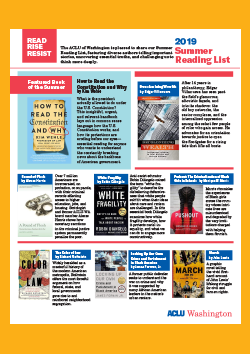READ RISE RESIST
2019 Summer Reading List
The ACLU of Washington is pleased to share our Summer Reading List, featuring diverse authors telling important stories, uncovering essential truths, and challenging us to think more deeply.
Featured Book of the Summer
How to Read the Constitution and Why
by Kim Wehle
What is the president actually allowed to do under the U.S. Constitution? This insightful, urgent, and relevant handbook lays out in common sense language how the U.S. Constitution works, and how its protections are eroding before our eyes—essential reading for anyone who wants to understand the constantly breaking news about the backbone of American government.
Pound of Flesh
by Alexes Harris
Over 7 million Americans are either incarcerated, on probation, or on parole, with their criminal records often following them for life and affecting access to higher education, jobs, and housing. Sociologist and former ACLU-WA board member Alexes Harris analyzes the rise of monetary sanctions in the criminal justice system and shows how they permanently penalize and marginalize the poor.
Pushout: The Criminalization of Black Girls in Schools
by Monique W. Morris
Morris chronicles the experiences of Black girls across the country whose intricate lives are misunderstood, highly judged—by teachers, administrators, and the justice system—and degraded by the very institutions charged with helping them flourish.
The Color of Law
by Richard Rothstein
Widely heralded as a “masterful” (Washington Post) and “essential” (Slate) history of the modern American metropolis, Rothstein’s The Color of Law offers “the most forceful argument ever published on how federal, state, and local governments gave rise to and reinforced neighborhood segregation” (William Julius Wilson).
Decolonizing Wealth
by Edgar Villanueva
After 14 years in philanthropy, Edgar Villanueva has seen past the field's glamorous, altruistic façade, and into its shadows: the old boy networks, the savior complexes, and the internalized oppression among the select few people of color who gain access. He advocates for an orientation towards justice to open the floodgates for a rising tide that lifts all boats.
White Fragility
by Robin Diangelo
Anti-racist educator Robin DiAngelo coined the term “white fragility” to describe the disbelieving defensiveness that white people exhibit when their ideas about race and racism are challenged. In this essential book DiAngelo examines how white fragility develops, how it protects racial inequality, and what we can do to engage more constructively.
Locking Up Our Own: Crime and Punishment in Black America
by James Forman, Jr.
Former public defender James Forman, Jr. seeks to understand the war on crime that began in the 1970s and why it was supported by many African American leaders in the nation’s urban centers.
March
by John Lewis
March is a graphic novel telling the vivid first-hand account of John Lewis' lifelong struggle for civil and human rights.
Locked Down, Locked Out: Why Prison Doesn’t Work and How We Can Do Better
by Maya Schenwar
Looking toward a future beyond imprisonment, Schenwar profiles community-based initiatives that successfully deal with problems—both individual harm and larger social wrongs—through connection rather than isolation, moving toward a safer, freer future for all of us.
The Line Becomes a River: Dispatches from the Border
by Francisco Cantu
Plagued by a growing awareness of his complicity in a dehumanizing enterprise, Cantu left the Border Patrol. His memoir “lays bare, in damning light” the “casual brutality” of our immigration system (New York Times).
One Person, No Vote
by Carol Anderson
African American participation in the vote has declined drastically since the 2013 Supreme Court decision that eviscerated the Voting Rights Act. Anderson follows the story of government-dictated racial discrimination as more and more states adopt voter suppression laws—and she explores the resistance: the organizing, activism, and court battles to restore the basic right to vote to all Americans.
Stamped from the Beginning
By Ibram X. Kendi
The National Book Award winning history of how racist ideas were created, spread, and deeply rooted in American society. As Kendi shows, racist ideas did not arise from ignorance or hatred. They were created to justify and rationalize deeply entrenched discriminatory policies and the nation's racial inequities.
ACLU SPOTLIGHT: POWERFUL WOMEN’S VOICES
Eloquent Rage: A Black Feminist Discovers Her Superpower
by Brittany Cooper
Good and Mad: The Revolutionary Power of Women’s Anger
by Rebecca Traister
Rage Becomes Her: The Power of Women’s Anger
by Soraya Chemaly
There has been a recent spotlight on the discrimination, harassment, and violence women endure every day. These three important books, all published in 2018 and all widely acclaimed, explore women’s anger: its past and present, the costs of expressing it, and its immense power as a force for positive change.
Sissy
by Jacob Tobia
From the moment a doctor in Raleigh, North Carolina, put "male" on Jacob Tobia's birth certificate, everything went wrong. Writing with the fierce honesty, wildly irreverent humor, and wrenching vulnerability that have made them a media sensation, Jacob shatters the long-held notion that people are easily sortable into "men" and "women." Sissy guarantees that you'll never think about gender--both other people's and your own--the same way again.
How All Politics Became Reproductive Politics: From Welfare Reform to Foreclosure to Trump
by Laura Briggs
From longer work hours to the election of Donald Trump, our current political crisis is above all about reproduction. Briggs brilliantly outlines how politicians’ racist accounts of reproduction—such as stories of Black “welfare queens” —were the leading wedge in the government disinvestment in families.

